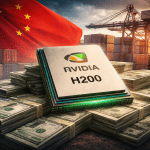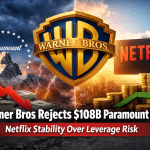Nvidia’s $100 Billion Bet on OpenAI: Cash Infusion, Chip Leasing, and Bubble Fears
Nvidia CEO Jensen Huang has agreed to invest up to $100 billion in OpenAI — a landmark deal that gives the chipmaker equity while guaranteeing billions in GPU leasing revenue, fueling hopes of an AI breakthrough but also stoking fears of a dot-com-style bubble.
The cash-based investment, revealed this week, will be funneled primarily into leasing Nvidia’s cutting-edge graphics processing units (GPUs). Instead of buying hardware outright, OpenAI will spread payments across the lifespan of the chips, effectively locking itself into Nvidia’s supply chain while conserving capital for operations.
This unusual structure means Nvidia profits twice: first by taking a direct equity stake in OpenAI, and second by selling — or rather leasing — the very chips OpenAI needs to build its next wave of AI supercomputers.
What’s New in This Deal
Most reports highlight the $100 billion figure, but sources close to the agreement say the initial $10 billion tranche will arrive within weeks to support OpenAI’s Abilene, Texas, data center — the first of eight planned U.S. sites. Oracle, through its Stargate project, will lease and operate part of the facility, effectively underwriting some of the financial risk.
The financing structure — where upfront capital is offset by long-term leasing commitments — mirrors strategies seen in other fast-moving sectors like crypto infrastructure, where exchanges and blockchain networks often raise funds only to channel them straight back into mining rigs or cloud compute.
OpenAI CFO Sarah Friar confirmed that Oracle and Nvidia are using their balance sheets to jumpstart capacity, telling CNBC:
“In Nvidia’s case, they’re putting together some equity to get it jumpstarted, but importantly, they will get paid for all those chips as those chips get deployed.”
Why Analysts Are Nervous
While the deal secures OpenAI’s access to compute, critics warn that this setup resembles financial engineering more than sustainable growth.
Jamie Zakalik, analyst at Neuberger Berman, told CNBC:
“The circular nature of this deal is goosing up everyone’s earnings and everyone’s numbers. But it’s not actually creating anything.”
Nvidia’s market cap has ballooned to $4.3 trillion, while OpenAI’s private valuation has touched $500 billion — numbers some see as disconnected from fundamentals. The parallels to AOL and the dot-com boom are hard to ignore.
Geopolitics and Competition
The U.S.–China AI rivalry looms large. Nvidia is facing antitrust pressure in Beijing and a partial ban on AI chip sales. Meanwhile, China’s DeepSeek-R1 is emerging as a genuine competitor, with government backing. Nvidia’s tie-up with OpenAI — alongside partners Microsoft, Oracle, SoftBank, and Stargate — is as much about securing U.S. dominance as it is about building data centers.
The Bubble Question
OpenAI chief Sam Altman brushed off bubble fears, arguing that customer demand will justify the buildout:
“We need to keep selling services to consumers and businesses — and building these great new products that people pay us a lot of money for. As long as that keeps happening, that pays for a lot of these data centers, a lot of chips.”
But the lingering question is whether consumer and enterprise revenues can scale quickly enough to meet the pace of investment.
FAQ: Nvidia’s $100B OpenAI Deal
Why is this deal structured around leasing chips?
Leasing allows OpenAI to spread costs over years rather than burning cash upfront, while still guaranteeing Nvidia long-term revenue.
How much money is coming first?
About $10 billion will arrive within weeks to finance the first Abilene, Texas, data center.
What makes investors nervous?
The risk that Nvidia’s investment simply cycles back as GPU revenue, inflating numbers without creating sustainable value.
Could this spark an AI bubble?
Yes — analysts are drawing comparisons to the dot-com crash, warning valuations may be inflated if demand slows.
Where does China fit in?
China has cracked down on Nvidia’s chip sales and is promoting rivals like DeepSeek-R1, intensifying the AI arms race.














